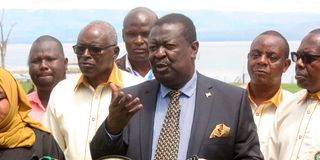State tightens grip on the work of State corporations

Prime Cabinet Secretary Musalia Mudavadi speaks during the induction workshop for board members of state corporations, at Lake Naivasha Resort on April 12.
What you need to know:
- President Ruto has previously been accused of micromanaging state affairs.
- Parastatal heads now submit notices and agenda points of all board and committee meetings.
The government has moved to stamp its authority on the running of state corporations, a development many see as an extension of the Kenya Kwanza administration’s hands-on style of management.
In a letter addressed to all chairpersons and chief executive officers of state agencies, Inspector General (IG) of State Corporations James Warui directed the parastatal heads to henceforth submit notices and agenda points of all board and committee meetings. Mr Warui further ordered that the minutes of the said meetings be immediately submitted following the conclusion of their deliberations.
“For the Inspector General (Corporations) to fulfil his mandate as set out in Section 18(2) of the State Corporations Act, kindly note that you will henceforth be required to submit on an ongoing basis notices and agenda of board and committee meetings and any board and/or committee papers in good time before the meeting, and minutes of board or committee meetings to be submitted without delay following the conclusion of such meetings,” reads the letter in part.
“You’ll also be required to submit any other information that the IG may require to facilitate effective monitoring of the performance of a state corporation.”
The corporation bosses were directed to submit the documents either in soft copies via email, or hard copies to be delivered at the IG’s office situated at Railways headquarters.
According to the Act that establishes the IG’s office, Mr Warui’s responsibilities entail advising the government on the effective running of state corporations, reporting periodically to the Cabinet Secretaries on management practices within the entities under their respective dockets, as well as reporting to the Auditor General any cases of misappropriation in state-owned entities.
To that effect, the law gives the IG authority to call for and inspect all records and documents that relate to the functions of state corporations, enter and inspect the corporations’ premises, and attend meetings of boards or committees of state entities if he deems it necessary for the effective carrying out of his duties.
The renewed push to focus on the corporations is set to draw a backlash from government critics, who, in the recent past, have accused President William Ruto of micromanaging state affairs.
Last month, opposition chief Raila Odinga faulted Dr Ruto for what he termed singlehandedly attempting to handle too many crucial government functions at the same time, warning that the style was likely to result in catastrophic consequences.
The controlling and hands-on style has been seen by some as implying lack of trust and confidence in junior appointees, with opposition leaders terming it a recipe for perpetual fear among state officers.
Government proponents, on the other hand, have come to the President’s defence, arguing that he has to take full control as he bears the greatest responsibility for every government decision.
For his part, Dr Ruto has in past media interviews sought to exonerate himself from the micromanagement accusations, explaining that the reason he is particular about how he wants those under him to work is that he is interested in seeing them succeed.
“I have had a good working relationship with my Cabinet Secretaries so far. We are in harmony and have been meeting to ensure they succeed. Some have labelled me a micromanager or being hands-on. But the reason I am very particular is that when a PS or CS fails, I have failed too,” Dr Ruto told journalists in August.
“The work they are doing is the responsibility Kenyans gave me. I have an interest in making sure every minister or PS succeeds; their success is my success and it is the success of Kenya.”





